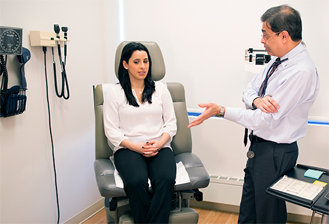 Currently, most people seek out the help of their primary care physician for issues of mental health. In fact, recent studies have estimated that 70% of a primary-care doctor’s practice now involves management of psycho-social issues.
Currently, most people seek out the help of their primary care physician for issues of mental health. In fact, recent studies have estimated that 70% of a primary-care doctor’s practice now involves management of psycho-social issues.
Why is this?
And, should this be the case?
Reasons Patients Tend To See A Primary Care Physician
One reason is ease and comfort. People have been conditioned by insurance companies to “start” with their primary care physician. In many ways, this is a good thing.
For example, many patients have developed a history and a trusting relationship with their family doctor and feel most comfortable when their doctor is coordinating care.
Others, however, are seeking to avoid seeing a specialist because of the stigma of depression which many fear could be discovered by an employer or nosy family member.
On the whole, patients seeking the care of a primary care physician is a net positive because there is so much need for mental health care in today’s society. If primary care doctors didn’t offer help, many people would go without it.
The Downside Of Not Seeing A Psychiatrist
While it was mentioned earlier that a large portion of a primary care doctor’s job deals with mental health issues, research has shown that only about 40% of people in treatment for depression actually get adequate care.
There are numerous reasons why this is the case.
First, general practitioners tend to not be as well-informed about depression as mental health specialists. This is obvious, as their expertise is designed to be more broad than deep. This can sometimes lead to under treatment (not prescribing enough medication), over treatment (prescribing too much medication), or inappropriate treatment (not prescribing the proper medication). Along those lines, most primary care doctors are not trained on the nuances of the many medications available — which ones are best for particular symptoms and what to do if the lowest dose does not work.
Second, when they do diagnose depression, primary care doctors don’t often provide enough information on drugs’ side effects, which can be common, especially at first. For example, mild side effects can often start within a day or two of beginning a medication, but the benefits can sometimes take a few weeks to show up. Therefore, if a patient is under-educated on what to expect, they can often quit their medication. Psychiatrists, on the other hand, are able to take the time to explain to their patients that the side effects are often temporary and that sticking with them will lead to the best outcome.
Third, research has shown that medication and psychotherapy together are more effective for treating depression and other mental health issues than medication alone. So, even if a primary care doctor does properly describe medication, it’s often not enough for optimal care. A psychiatrist will be able to treat (or coordinate the treatment of) both the medication and therapy side of a patient’s treatment.
Finally, most primary care physicians are not trained to properly recognize many forms of depression and anxiety in the first place. For example, most patients don’t arrive saying they feel sad or depressed. Typically, they complain about physical issues (say fatigue or insomnia). Many doctors don’t realize that these could be the physical manifestations of a deeper underlying cause (say depression) and simply tend to the physical symptoms.
Should You See Your Primary Care Physician Or A Psychiatrist?
Based on the tone of this article, you can likely guess that I feel in most cases it’s wise to seek out the help of a psychiatrist.
You’re more likely to get the right diagnosis, the right treatment, and the right follow-up.
After all, you wouldn’t go to your primary care physician for knee surgery…you would see a specialist. The same logic applies here.
With that said, if you do seek treatment from your primary care doctor first, just be willing to make an appointment with a specialist if your doctor tries medication and it’s not working for you. And, certainly, if you are having thoughts of dying please seek care immediately.
—–
My name is Amanda Itzkoff, MD. I am a New York City based Psychiatrist and Assistant Professor at Mount Sinai Medical Center.
For additional information, please feel free to email our office at Amanda.Itzkoff@gmail.com.
To schedule an appointment, call our offices at 917-609-4990.
Be Well!

